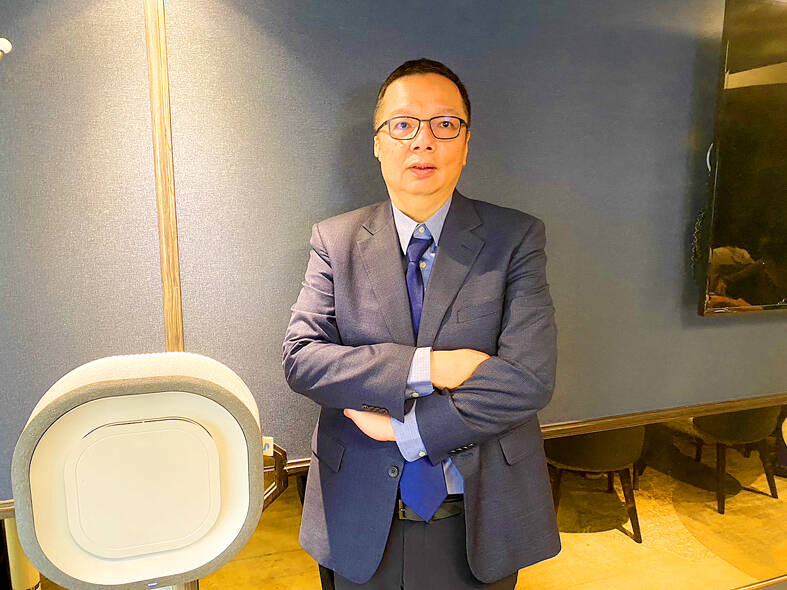Nova Technology Corp (朋億), a high-technology process equipment supplier that specializes in serving semiconductor companies, yesterday gave a lukewarm forecast for next year as semiconductor companies in China and Taiwan are slowing down their new fab construction efforts due to an inventory-driven slump.
Nova said as customers did not cancel orders entirely, its backlog orders have climbed 6.22 percent annually to NT$12.5 billion (US$400 million), from NT$11 billion during the same period last year.
The number is an all-time high for the company, but Nova said it would take about two to two-and-a-half years for it to convert those orders into revenue — while it would have taken one year in the past — as customers suspended some of their new fab construction projects in response to an inventory-driven slump.

Photo: Grace Hung, Taipei Times
A lack of supply of some key materials such as engineering plastics is also playing a role in the situation, Nova said.
Key material shortages have been in place for the past two years, which led to a cost increase of at least 60 percent compared with two years ago.
“We are looking at a flat [year next year] as compared with the second half of this year. Demand does not look good. Some Chinese chipmakers have put off their construction of new fabs,” Nova president David Ma (馬蔚) told reporters in Taipei yesterday.
“We do not expect a significant growth in revenue unless we land new supply contracts overseas next year,” Ma said.
Powerchip Semiconductor Manufacturing Corp (力積電) this month announced that it is planning to build an ¥800 billion (US$5.42 billion) factory in Japan with financing from investment group SBI Holdings Inc and the Japanese government.
Powerchip makes drive ICs and power management ICs for customers on a contract basis.
Nova is also vying for a supply contract from Taiwan Semiconductor Manufacturing Co (台積電) for its factories in Kumamoto, Japan, given its long-term partnership with Japan’s Sumitomo Chemical Co, Nova said.
Besides, Nova is exploring new opportunities to supply process equipment to chip testing and packaging service providers, who are considering whether to build new capacity in Malaysia, Ma said.
China is the biggest revenue source for Nova, accounting for 54.5 percent of last quarter’s revenue of NT$6.45 billion.
Taiwan comes next, comprising 36.7 percent of Nova’s revenue.
The company’s main revenue source in Southeast Asia is Singapore, where United Microelectronics Corp (聯電), the second-biggest foundry company in Taiwan, is expanding a 12-inch fab, Ma said.
Net profits contracted about 6 percent year-on-year to NT$248 million in the third quarter, from NT$264 million in the same period last year. Its earnings per share dropped to NT$3.52 from NT$3.89.

Semiconductor shares in China surged yesterday after Reuters reported the US had ordered chipmaking giant Taiwan Semiconductor Manufacturing Co (TSMC, 台積電) to halt shipments of advanced chips to Chinese customers, which investors believe could accelerate Beijing’s self-reliance efforts. TSMC yesterday started to suspend shipments of certain sophisticated chips to some Chinese clients after receiving a letter from the US Department of Commerce imposing export restrictions on those products, Reuters reported on Sunday, citing an unnamed source. The US imposed export restrictions on TSMC’s 7-nanometer or more advanced designs, Reuters reported. Investors figured that would encourage authorities to support China’s industry and bought shares

TECH WAR CONTINUES: The suspension of TSMC AI chips and GPUs would be a heavy blow to China’s chip designers and would affect its competitive edge Taiwan Semiconductor Manufacturing Co (TSMC, 台積電), the world’s biggest contract chipmaker, is reportedly to halt supply of artificial intelligence (AI) chips and graphics processing units (GPUs) made on 7-nanometer or more advanced process technologies from next week in order to comply with US Department of Commerce rules. TSMC has sent e-mails to its Chinese AI customers, informing them about the suspension starting on Monday, Chinese online news outlet Ijiwei.com (愛集微) reported yesterday. The US Department of Commerce has not formally unveiled further semiconductor measures against China yet. “TSMC does not comment on market rumors. TSMC is a law-abiding company and we are

FLEXIBLE: Taiwan can develop its own ground station equipment, and has highly competitive manufacturers and suppliers with diversified production, the MOEA said The Ministry of Economic Affairs (MOEA) yesterday disputed reports that suppliers to US-based Space Exploration Technologies Corp (SpaceX) had been asked to move production out of Taiwan. Reuters had reported on Tuesday last week that Elon Musk-owned SpaceX had asked their manufacturers to produce outside of Taiwan given geopolitical risks and that at least one Taiwanese supplier had been pushed to relocate production to Vietnam. SpaceX’s requests place a renewed focus on the contentious relationship Musk has had with Taiwan, especially after he said last year that Taiwan is an “integral part” of China, sparking sharp criticism from Taiwanese authorities. The ministry said

US President Joe Biden’s administration is racing to complete CHIPS and Science Act agreements with companies such as Intel Corp and Samsung Electronics Co, aiming to shore up one of its signature initiatives before US president-elect Donald Trump enters the White House. The US Department of Commerce has allocated more than 90 percent of the US$39 billion in grants under the act, a landmark law enacted in 2022 designed to rebuild the domestic chip industry. However, the agency has only announced one binding agreement so far. The next two months would prove critical for more than 20 companies still in the process